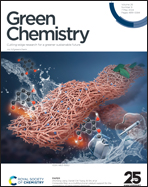Preparation of chemically recyclable bio-based semi-aromatic polyamides using continuous flow technology under mild conditions †
Abstract
2,5-Furandicarboxylic acid (FDCA) from carbohydrate refining has been a promising bio-based building block for the construction of high-performance polymers. Herein, we not only choose renewable monomers, but employ an eco-friendly continuous flow approach to synthesize furan-based semi-aromatic polyamides (FPAs). The characteristics of the polycondensation reaction are firstly explored by regulating the operating parameters. Using esterified derivatives of FDCA and linear aliphatic diamines, structure–property analysis of synthesized FPAs is performed. The molecular weights, thermal properties and stability exceed those previously reported in the literature for both melt and enzymatic polycondensation. Furthermore, a variable-temperature two-step synthesis procedure is employed to improve the isolated yield of FPAs by removing by-products in the form of gas–liquid slug flow. The N-methylation rate and terminated end-groups uncover the advantages of continuous flow synthesis in terms of preventing side reactions, which promotes the growth of molecular weight. Finally, the FPAs are selectively hydrolyzed under acidic conditions. A closed loop cycle for recycling can be completed when the monomers are further polymerized back to a polyamide. Compared to traditional fossil-based manufacturing processes, the use of renewable resources and continuous flow technology in the production of value-added polymers provides a novel approach for the development of sustainable, carbon-dioxide-neutral industries.



 Please wait while we load your content...
Please wait while we load your content...